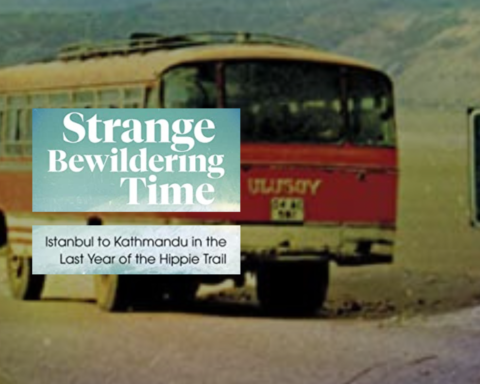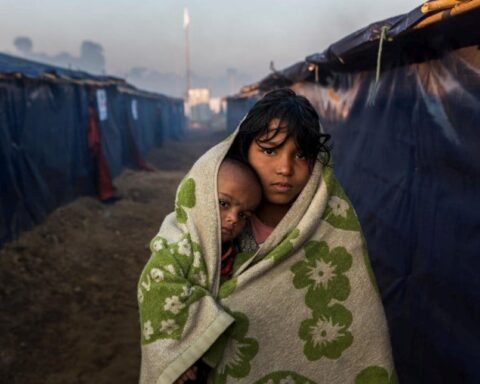The conversation that Conservative leadership candidate Kellie Leitch has been trying to open — about immigrants, integration and “anti-Canadian values” — was well underway in Montreal on Thursday at the Ritz-Carlton Hotel.
While potential Leitch supporters weren’t thick on the ground at the Canada 2020 Global Progress gathering, the discussions at this event showed that integration of immigrants is a big issue on the progressive left in Canada — and the world — as well as on the political right.
They’re not the same conversations, though, so someone is eventually going to have to bring them together.
Immigration and integration was a running theme when Prime Minister Justin Trudeau and London Mayor Sadiq Khan sat down for a chat on stage in the Ritz ballroom on Thursday morning.
Of course it would be — Khan is the first Muslim mayor of London, who has already tussled publicly with Donald Trump over the presidential candidate’s anti-Muslim rhetoric. Khan, who only came to the job this spring, is on his way to the United States this week, so we can expect the lively back-and-forth to continue.
Khan warned that whenever critics say that Muslim values are inconsistent with Western values, they’re singing from the same songbook as the so-called Islamic State, which also believes that walls between cultures are better than bridges.
“There are people in Daesh and so-called ISIS who say it’s incompatible to be a Muslim and hold Western liberal values,” he said. “Daesh and so-called ISIS hate someone like me,” Khan said, because he proves that Muslim and Western values can co-exist in one person, as well as within the larger community.
On stage at the Ritz-Carlton, Khan lavished praise on Canada in general and Trudeau in particular, calling this country an international “beacon” for the way Trudeau had welcomed refugees and newcomers to this country. He called last year’s election an “inspiration.”
Trudeau, for his part, was saying all the right (or should we say left?) things about the importance of making newcomers feel welcome in Canada.
But it wasn’t a total love-in. Prodded by moderator Jennifer Ditchburn to reconcile gender diversity with the male-and-female segregation at a mosque he attended earlier this week, Trudeau said there was still “work to do” on integrating diverse values.
When Ditchburn asked Khan and Trudeau how their embrace of diversity and integration could go beyond words, the Prime Minister responded with — well, some more words, about the need to “demonstrate” to people why newcomers to Canada are an asset, not something to be feared.
The better answer to the beyond-words question was found upstairs in a smaller meeting room after the Khan-Trudeau session.
There, around a large meeting table in a breakout session at the Global Progress meeting, an incredibly eloquent Labour MP from Britain, Chuka Umunna, tackled head-on the need to have the conversation about immigration with more than lofty or sentimental words. It’s simply not good enough, he said, to write off fears about immigration as mere racism — even if that’s what it is.
Umunna is the son of an English-Irish mother and a Nigerian-born father, who has been occasionally described (over his protests) as Britain’s Barack Obama. So he’s had a lifelong immersion in where cultural integration is working in the United Kingdom, and where it’s not. Forget about all those idyllic images of cultural diversity that London put on display during the 2012 Olympic ceremonies, Umunna said — “we are not integrated.”
Umunna’s own constituency of Streatham was part of the borough with the highest votes in favour of remaining in the European Union during the Brexit referendum last June.
But he’s been keeping a close eye on what is feeding the anti-immigrant sentiment that gave so much fuel to the forces campaigning successfully to get Britain to leave the EU. The only way to examine the sentiment, he says, is right there on the ground.
He went to take a look for himself at the areas where people voted in high numbers for Brexit and found huge increases in immigration during recent years, resulting in major dislocation in the local labour markets and a lack of social services to handle the needs of newcomers. As a result, the long-time residents and newcomers live in isolated pockets, rarely interacting with each other.
It’s not enough to simply tell people to integrate, or even to teach about it. “We cannot wait for our schools to do the job of integration for us,” Umunna said.
Talking about integration isn’t the same as living with integration, in other words, and that’s an intensely local job, that has to reach right down to the streets, homes and businesses where people conduct their day-to-day lives.
What Umunna was saying, in effect, was that this roiling debate over immigration and integration is not going to be resolved through abstractions or distance on either side. As Khan was saying as well, the extremist view is one in which cultures can’t co-exist or be reconciled.
The people who ticked off the box in favour of screening for Canadian values on Leitch’s survey — the survey that tipped some of this debate into the open in Canada — may well be living in worlds similar to the ones Umunna described: communities where immigrants and non-immigrants live in isolated pockets.
Similarly, the people preaching about tolerance and acceptance of newcomers may not be having many conversations with the kind of people who are expressing fears and apprehension about open borders in Canada.
If immigration and integration can’t work with this kind of polarized isolation, neither can the debate. The conservative right is talking about these issues. So is the progressive left, as the Global Progress summit vividly illustrated. It may be time to put these two solitudes in one room to talk it out.
By arrangement with ipolitics.ca




